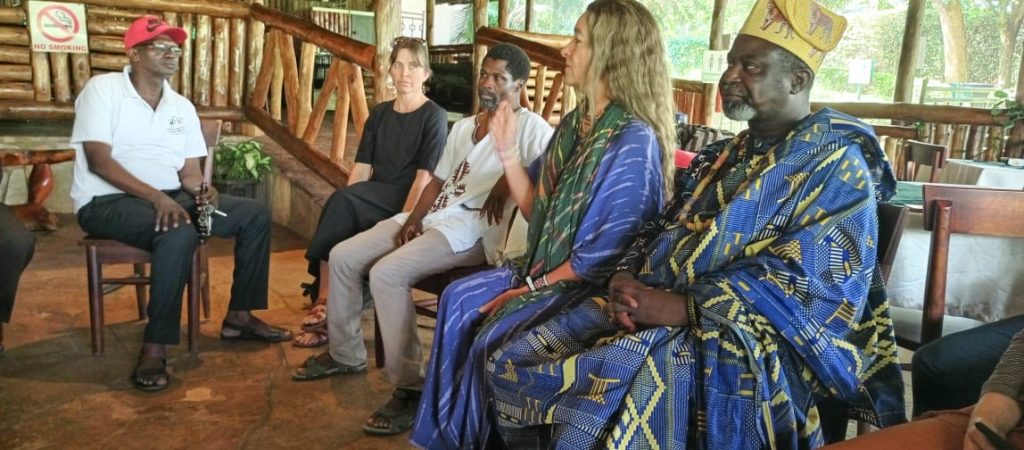
AFRICE HOSTS INTERNATIONAL EARTH JURISPRUDENCE
PRACTITIONERS
AFRICE is one of the founder members of the African Jurisprudence Collective (AEJC), which
was formed early 2018 by the pioneer graduates of a 3- year-intensive training in Earth
Jurisprudence practice, facilitated by the Gaia Foundation.
The AEJC, composed of the course graduates, facilitators and indigenous communities
(custodians of nature) is now hosted by the Earthlore organization in Zimbabwe. The collective
is vibrant and practical in supporting member organizations and individuals who are working
with indigenous communities that are reviving their traditional governance and knowledge
systems for protection of Biodiversity and food systems in Africa.
The 2017 course graduates have since begun a long journey to supporting communities in
their countries to revive and strengthen their customary laws and respective traditional
knowledge systems in protection of key biodiversity areas (Sacred Natural Sites and Territories-
SNS) and traditional food diversity.
AFRICE has been successful in facilitating the Bagungu indigenous people of Buliisa in their
journey to preserve and protect SNS, along lake Albert, within Murchision falls National park
and the lakes’ longest lagoons in the Bunyoro region. This is part of the long journey to
implementing the African commission(AC) Resolution 372 on protection of SNS as Key
Biodiversity areas and sensitive eco-cultural centers on the Earth and entire universe.
Significant steps taken by AFRICE to wards realization of this resolution on SNS, include,
supporting the elders (custodians and 26 clans to document traditional governance
systems/laws for protection of SNS, enlisting the support of Buliisa local government on
enacting an ordinance for protection of SNS and adjacent ecosystems (territories) and involving
the Bunyoro Kingdom in the process of supporting custodians of SNS in strengthening the
respective practices in the kingdom. Alongside the custodians of SNS, are women who are the
custodians of traditional indigenous seeds, which seeds make a major component for traditional
rituals and ceremonies in maintaining food diversity and heritage in the community. Elderly
women have recuperated long lost seed varieties. They have planted and multiplied them, while
maintaining the associated seed knowledge for future food sovereignty.
The visit of the AEJC partners to AFRICE in Buliisa district and Bunyoro Kingdom happened
between 2 nd to 10 th June 2024. The delegation included Liz Hosken, the Director of Gaia
Foundation and facilitator of the African Earth Jurisprudence transformation course, based in
South Africa, John Riley a member of the Putnam family foundation who are the friends of the
African Earth Jurisprudence practitioners based in Boston America, Method Gundiza, the
Director of Earthlore Foundation-Zimbabwe, Simon Mitambo the Director of Society for
Alternative Learning and Transformation (SALT)- Kenya, Chief Atawe AKoyi Oussoulio the
Director of Grabe Benin in Benin, Samuel Nandobe an International consultant from Cameroon
and Xervier from Cameroon.
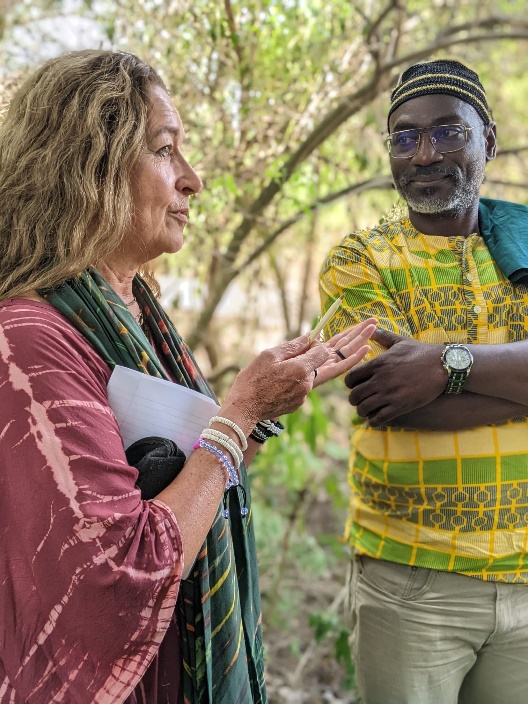
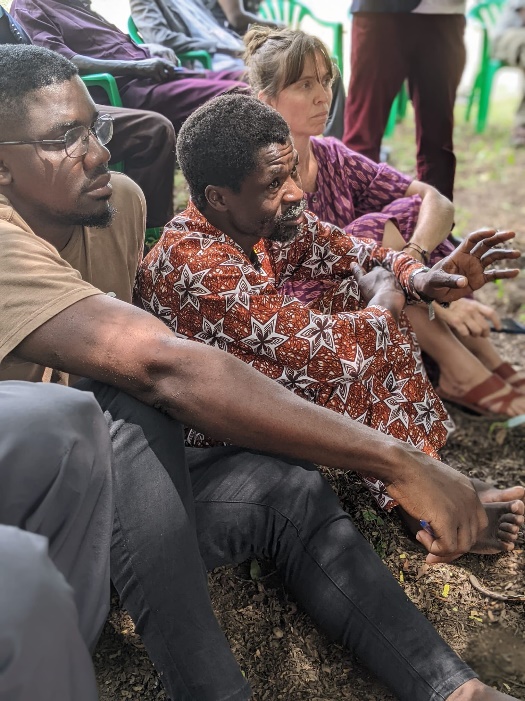
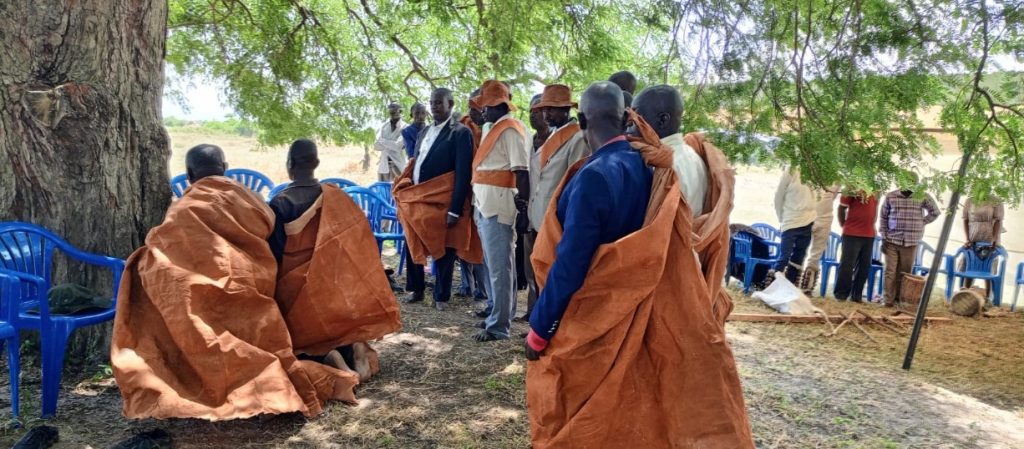
Learning Centre
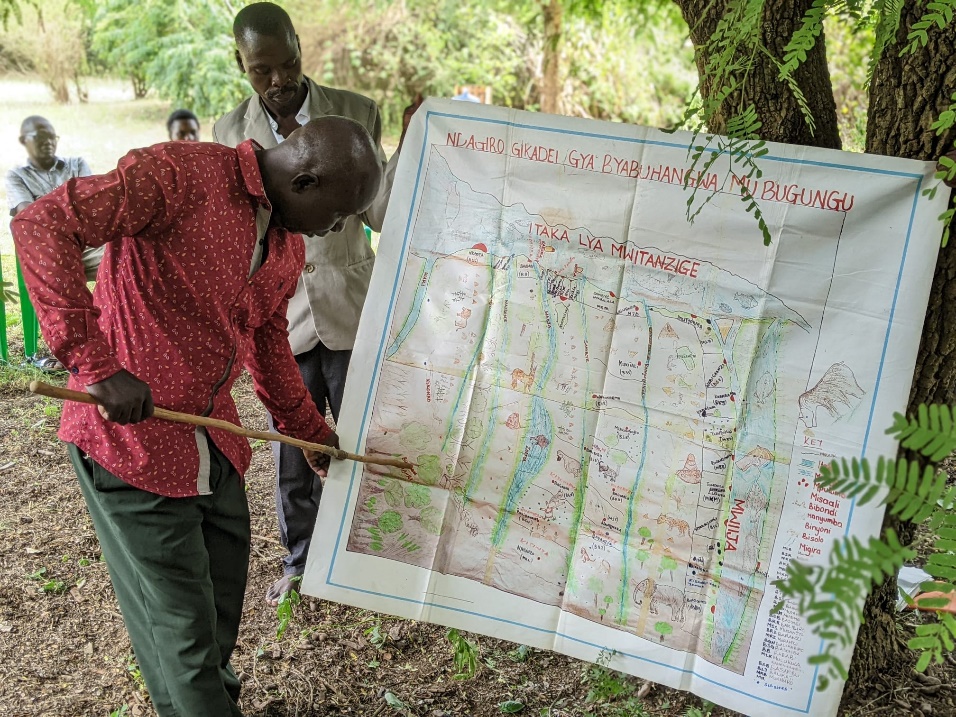
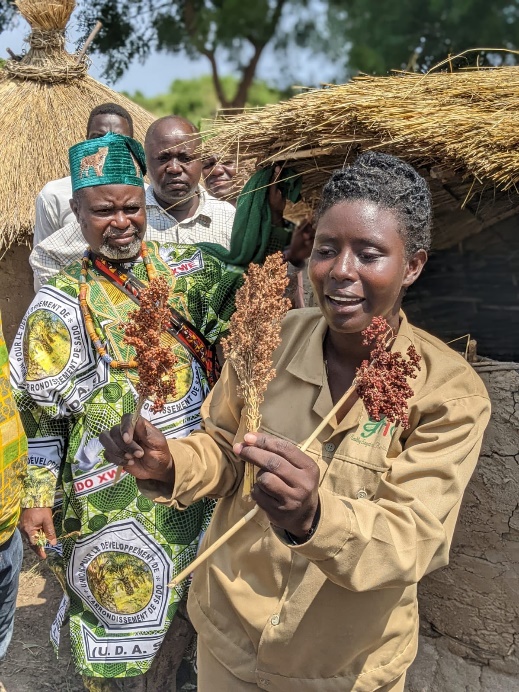
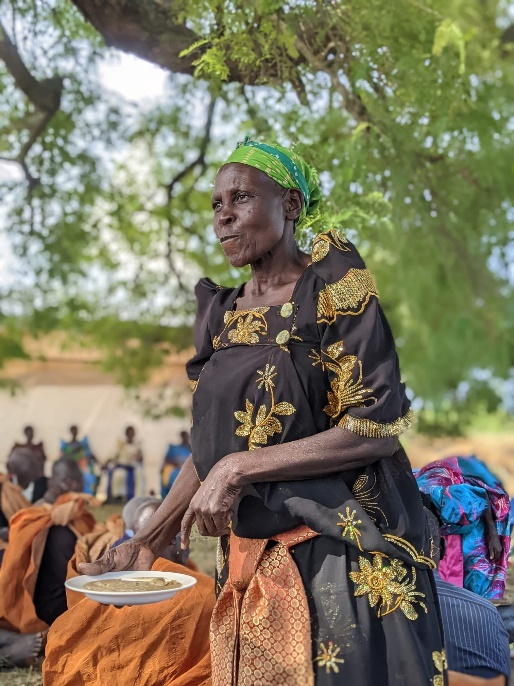
The partners spent most of their time at the Elephant view hotel in Murchision National Parks
where they had very close interactive dialogue with the custodians of SNS, the women
custodians of the indigenous seeds, the Buliisa district Local Government officials. Later, as the
visit came to an end, the Earth Jurisprudence practitioners had a long interactive dialogue with
the Bunyoro Kingdom represented by elder George Muhuruzi, the head of the kings’ regalia, Mr.
Robert Rukahemura the principal private secretary to the Prime minister of the kingdom and Mr.
Muhumuza Ibrahim the head of the traditional clans in the kingdom. During the interactions with
the four stakeholders responsible for protection of Sacred Natural Sites and associated natural
ecosystems and food, the following observations were made;
a) Custodians of Sacred Natural Sites (SNS)
Murchision falls (Pajawo) is a sensitive Sacred Natural site revered by the Bagungu. The
falls (sites) was an important place where major rituals and traditional ceremonies were
made for the purification of the Bunyoro/Bugungu land and the Socio-cultural welfare of
the Banyoro/Bagungu. The falls, since the loss of its name (Pajaawo)and, associated
rituals and cultural practices, has lost its cultural and ecological potency thus affecting
the entire Bunyoro/ Bugungu land and people negatively, in terms of information on
weather and seasonal changes.
The Bagungu (The indigenous people in Buliisa) used to visit the area now occupied by
the park (Murchision Falls National Park) to pay homage and offer sacrifice to the
Sacred Natural Sites within. There is now restricted entry in the park by the custodians
who would enjoy close relationship with the wildlife, make use of medicine and perform
other healing ceremonies for both human and non-human community.
Custodians noted that the President of Uganda had just mandated that elders be in
charge of the welfare of the Ugandan Lakes, including Albert, especially the fishing
activities at the lakes. Whereas this is a good gesture and realization of the ancestral
relationship between the Bagungu people and the lake, other opportunistic individuals,
the government and the communities around have not realized this ancestral
relationship to have been guarded by only the Balamansi (Custodians of SNS). It is
important that the Buliisa district local government expedite the implementation of
the(Buliisa) ordinance on Sacred Natural Sites that gives back the responsibility of
custodians in overseeing the lake activities through the relevant customs and customary
laws.
Custodians of the Sacred Natural Sites preparing to perform a ritual at the Community Seed
Learning Centre
One of the custodians of SNS displaying their ancestral maps
b) Women custodians of indigenous seeds
Indigenous seeds grown through agroecological practices are being emphasized both at
the AFRICE -supported community seed learning centre at Kitahuura, run by
knowledgeable farmers,especially women . The district of Buliisa and government need
to learn from the women’s experience if the issues of food security and sovereignty are
to be addressed. There is a very close relationship between the seed and associated
cultural practices among African communities which needs to be recognized, respected
and promoted.
The historical Bagungu farming practice where all crop farming was done in Ngwedo
(near the Murchision National Park) is severely threatened by the oil mining
infrastructure. The land is being downsized by the Oil Central Processing Facility
(OCPF) and households need to be supported to farm around their homes, which land
was historically reserved for animal grazing. After all, when well planned, animal grazing
supports crop growth and reduces the animal-crop conflict, and increases crop and food
productivity.
AFRICE Agroecologist showing the different indigenous seeds planted at the Centre and one of the
Bagungu women farmer demonstrating the different benefits (nutrition, cultural and health) that are
in the indigenous seeds
c) Buliisa district local government
The ordinance on SNS made at the district needs to be followed up with the office of the
Attorney General (AG). However, with or without the AG approval, the ordinance
provisions need to be implemented as approved by the district. The district, AFRICE and
the custodians need to work out the ordinance implementation plans and also meet
Uganda Wildlife Authority (UWA) to discuss the issue of Pajawo (The falls) and SNS
in the National Park.
d) Bunyoro Kingdom
AFRICE made a Memorandum of Understanding with Bunyoro Kingdom on
strengthening the SNS custodianship. The meeting with the AEJC and others are the
avenues in which this MOU shall be implemented. The meeting observed need for the
kingdom to leverage the Buliisa experience to mobilize support and strengthen the SNS
custodianship in the kingdom. AFRICE and African EJ Collective shall always be
consulted for technical and resource purposes in order to realize the MOU and the entire
process.
The purpose of the AEJC partners visit was to learn from the successes enlisted by
AFRICE on the African Commission Resolution 372 on protection of SNS. Together with
the purpose of supporting AFRICE on its journey with communities to revive community
ecological governance, the partners were extremely happy and grateful to have learned
from custodian’s work, the Buliisa support to the whole process, the women’s work on
seeds and food, and the strong Kingdom’s will to support custodians and their work in
the entire kingdom.
AFRICE was greatly humbled and felt privileged by the visit and looks forward to a
strengthened partnership.